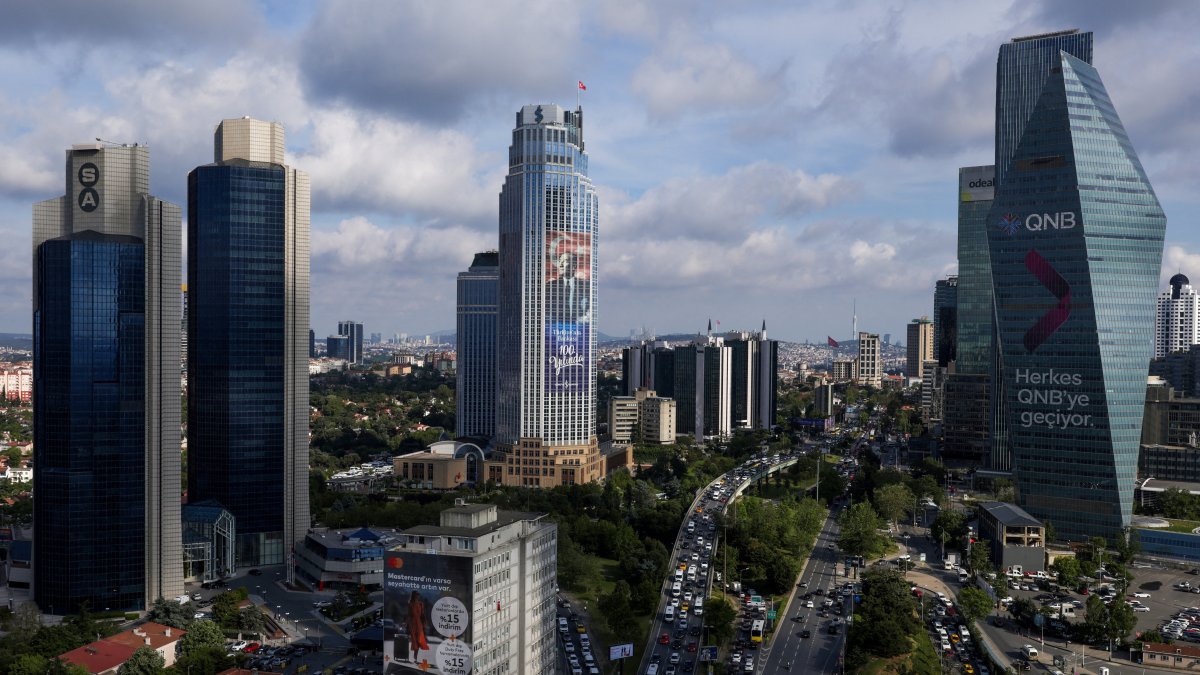Türkiye’s economy grew faster than anticipated between April and June, extending its streak to 20 consecutive quarters of expansion, despite a prolonged monetary tightening effort, official data showed Monday.
The second quarter gross domestic product (GDP) expanded by 4.8% compared to a year earlier and by 1.6% from the January-March period on a seasonally and calendar-adjusted basis, the Turkish Statistical Institute (TurkStat) said.
Economists said the quarter had benefited from having more working days than in the same period the year before, and from last year’s low base.
The expectations for the pace of growth in the April-June period ranged from 3.8% to 4.1%, according to surveys. The government forecasts 4% growth this year. It is expected to update its forecasts early this month.
Growth in the first quarter was revised up to 2.3% from 2%, the TurkStat data also showed, while economic expansion was revised up slightly to 3.3% from the previous 3.2% last year.
The institute also published a document along with the data detailing the revision of its GDP series as part of efforts to align with the European System of National Accounts.
Converging toward potential growth
Treasury and Finance Minister Mehmet Şimşek said Türkiye’s economy was on track to gradually converge toward its potential growth level as global trade uncertainties ease and financial conditions become more supportive.
He noted that revisions in the national income series did not bring “any fundamental change,” highlighting that growth in the first half of the year stood at 3.6% and annualized GDP had neared $1.5 trillion.
Şimşek emphasized that disinflation was continuing alongside growth, adding that the government would soon announce the 2026-2028 Medium-Term Program (MTP), aimed at securing “price stability and sustainable high growth” through stronger policy coordination.
The momentum comes against the backdrop of shifting monetary policy and as markets continue to monitor how global trade tensions and interest rate steps will shape growth prospects through year-end.
In December, the Central Bank of the Republic of Türiye (CBRT) started an easing cycle after having kept the main policy rate steady for eight months. Inflation has dipped from as high as 75% last year.
The central bank tightened policy in April in a move to ensure stability following market volatility over the arrest in March of Istanbul Mayor Ekrem Imamoğlu.
Imamoğlu was jailed pending trial over graft charges.
The bank recently returned to policy easing, with inflation falling to around 33%, and said the impact of tight policy can be seen in a slowdown in demand conditions.
Industry and Technology Minister Mehmet Fatih Kacır underscored that Türkiye had maintained uninterrupted growth for 20 consecutive quarters.
Kacır noted that the industrial sector expanded 6.1% in the second quarter, stressing the role of high-value-added production, exports and employment in driving development.
2nd among OECD countries, 4th in G-20
Trade Minister Ömer Bolat said Türkiye ranked as the second-fastest growing economy among Organisation for Economic Co-operation and Development (OECD) countries and the fourth-fastest in the G-20 during the second quarter.
Bolat emphasized that goods and services exports contributed 0.4 percentage points to growth and that investment spending showed a robust 8.8% rise, adding 2.2 percentage points to expansion.
He said investments have been consistently supporting growth for the past three consecutive quarters, and that the rise in production, investment and exports has also been reflected in labor market indicators.
“Türkiye’s economy achieved strong growth in the second quarter while exports increased, inflation and unemployment declined, and investment accelerated,” Bolat wrote on social media platform X.
“Supported by growth in the industrial and services sectors, the positive momentum in macroeconomic indicators continues to strengthen.”
Bolat added that annualized GDP reached a record $1.47 trillion as of the second quarter, up from nearly $1.36 trillion in 2024.
Türkiye’s current account deficit, which had stood at 5% of GDP in 2022, narrowed to 0.8% in 2024, and was at 1.3% of GDP as of the second quarter of 2025, well below its historical average, said the minister.
Bolat cited the government’s program, which he said is reinforcing the process of rebalancing and stabilizing the economy despite global and regional uncertainties.
He said the increase in national income, improvement in the current account deficit, decline in inflation, reduction in interest rates, upgrades in credit ratings, drop in the country’s risk premium, steps taken to ensure financial stability, growth in foreign exchange reserves, and efforts to ensure equitable distribution of social welfare all contribute to this strengthening momentum.
Bolat also noted positive labor market trends, saying that the unemployment rate had fallen to 8% in July, down 0.4 percentage points from the previous month.
The rate has remained below 10% for the past 27 months.
Bolat reiterated the government’s goal to achieve a new peak and exceed $390 billion in total foreign trade in goods and services this year.

The Daily Sabah Newsletter
Keep up to date with what’s happening in Turkey,
it’s region and the world.
SIGN ME UP
You can unsubscribe at any time. By signing up you are agreeing to our Terms of Use and Privacy Policy.
This site is protected by reCAPTCHA and the Google Privacy Policy and Terms of Service apply.

